
Contract bridge, or simply bridge, is a trick-taking card game using a standard 52-card deck. In its basic format, it is played by four players in two competing partnerships, with partners sitting opposite each other around a table. Millions of people play bridge worldwide in clubs, tournaments, online and with friends at home, making it one of the world's most popular card games, particularly among seniors. The World Bridge Federation (WBF) is the governing body for international competitive bridge, with numerous other bodies governing it at the regional level.

Pinochle, also called pinocle or penuchle, is a trick-taking ace–ten card game, typically for two to four players and played with a 48-card deck. It is derived from the card game bezique; players score points by trick-taking and also by forming combinations of characters into melds. It is thus considered part of a "trick-and-meld" category which also includes the game belote. Each hand is played in three phases: bidding, melds, and tricks. The standard game today is called "partnership auction pinochle".
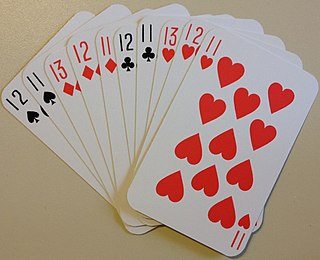
500 or Five Hundred is a trick-taking game developed in the United States from Euchre. Euchre was extended to a 10 card game with bidding and a Misère contract similar to Russian Preference, producing a cutthroat three-player game like Preference and a four-player game played in partnerships like Whist which is the most popular modern form, although with special packs it can be played by up to six players.

Euchre or eucre is a trick-taking card game commonly played in Australia, Canada, Great Britain, New Zealand, and the Midwestern United States. It is played with a deck of 24, 25, 28, or 32 standard playing cards. There are normally four players, two on each team, although there are variations for two to nine players.

Spades is a trick-taking card game devised in the United States in the 1930s. It can be played as either a partnership or solo/"cutthroat" game. The object is to take the number of tricks that were bid before play of the hand began. Spades is a descendant of the whist family of card games, which also includes bridge, hearts, and oh hell. Its major difference as compared to other whist variants is that, instead of trump being decided by the highest bidder or at random, the spade suit always trumps, hence the name.

Forty-fives is a trick-taking card game that originated in Ireland. The game is popular in many communities throughout Atlantic Canada as well as the Gaspé Coast in Québec. Forty-fives is also played in parts of Massachusetts and southern New Hampshire in New England, United States, as well as in the South Island of New Zealand.
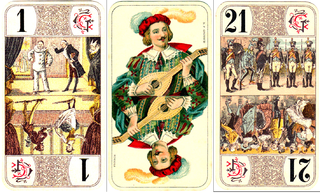
The game of French Tarot is a trick-taking strategy tarot card game played by three to five players using a traditional 78-card tarot deck. The game is played in France and also in French-speaking Canada. It should not be confused with French tarot, which refers to all aspects of cartomancy and games using tarot cards in France.
Rubber bridge is a form of contract bridge played by two competing pairs using a particular method of scoring. A rubber is completed when one pair becomes first to win two games, each game presenting a score of 100 or more contract points; a new game ensues until one pair has won two games to conclude the rubber. Owing to the availability of various additional bonus and penalty points in the scoring, it is possible, though less common, to win the rubber by amassing more total points despite losing two games out of three. Rubber bridge involves a high degree of skill but there is also a fair amount of luck involved in who gets the best cards. A popular variation of rubber bridge is known as Chicago.
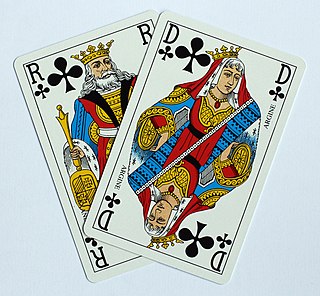
Belote is a 32-card, trick-taking, ace–ten game played primarily in France and certain European countries, namely Armenia, Belgium, Bulgaria, Croatia, Cyprus, Georgia, Greece, Luxembourg, Moldova, North Macedonia, Bosnia and Herzegovina and also in Saudi Arabia and Tunisia. It is one of the most popular card games in those countries, and the national card game of France, both casually and in gambling. It appeared around 1900 in France, and is a close relative of both Klaberjass and klaverjas. Closely related games are played throughout the world. Definitive rules of the game were first published in French in 1921.
Pedro is an American trick-taking card game of the all fours family based on auction pitch. Its most popular variant is known as cinch, double Pedro or high five which was developed in Denver, Colorado, around 1885 and soon regarded as the most important American member of the all fours family. Although it went out of fashion with the rise of auction bridge, it is still widely played on the western coast of the United States and in its southern states, being the dominant game in some locations in Louisiana. Forms of the game have been reported from Nicaragua, the Azores, Niobe NY, Italy, and Finland. The game is primarily played by four players in fixed partnerships, but can also be played by 2–6 individual players.
Pitch is an American trick-taking game equivalent to the British blind all fours which, in turn, is derived from the classic all fours. Historically, pitch started as "blind all fours", a very simple all fours variant that is still played in England as a pub game. The modern game involving a bidding phase and setting back a party's score if the bid is not reached came up in the middle of the 19th century and is more precisely known as auction pitch or setback.
These terms are used in contract bridge, using duplicate or rubber scoring. Some of them are also used in whist, bid whist, the obsolete game auction bridge, and other trick-taking games. This glossary supplements the Glossary of card game terms.
Sueca is a 4 player-partnership point trick-taking card game of the ace–ten family, and a popular variant of the Bisca card game. The game is played in Portugal, Brazil, Angola and other Portuguese communities. Its closest relative is the very similar German game Einwerfen.

Bluke or Blook is a trick-taking card game known to parts of the East Coast and the Midwest and possibly other parts of the United States of America. The game features use of the Jokers, which are sometimes referred to as the Blukes. One version goes under the name Back Alley or Blooper and appears to be a game that originated in the American military probably during the Second World War.
304, pronounced three-nought-four, is a trick-taking card game popular in Sri Lanka, coastal Karnataka, Tamil Nadu and Maharashtra, in the Indian subcontinent. The game is played by two teams of two using a subset of the 52 standard playing cards so that there are 32 cards in play.
Smear is a North-American trick-taking card game of the all fours group, and a variant of pitch (setback). Several slightly different versions are played in Michigan, Minnesota, Northern and Central Iowa, Wisconsin and also in Ontario, Canada.
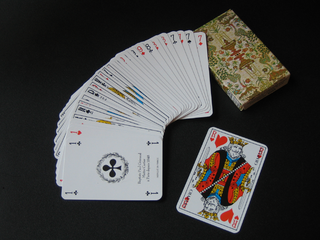
Manille is a Catalan French trick-taking card game which uses a 32 card deck. It spread to the rest of France in the early 20th century, but was subsequently checked and reversed by the expansion of belote. It is still popular in France and the western part of Belgium.

The following is a glossary of terms used in card games. Besides the terms listed here, there are thousands of common and uncommon slang terms. Terms in this glossary should not be game-specific, but apply to a wide range of card games played with non-proprietary packs. It should not include terms solely related to casino or banking games. For glossaries that relate primarily to one game or family of similar games, see Game-specific glossaries.
Russian Schnapsen, Thousand Schnapsen, 1000 or Tysiacha is a trick-taking game of the ace–ten family for three players, the aim of which is to score over 1000 points to win the game. It is a variant of the popular Austrian game of Schnapsen. Like its parent, Russian Schnapsen features "marriages" which are worth extra points.
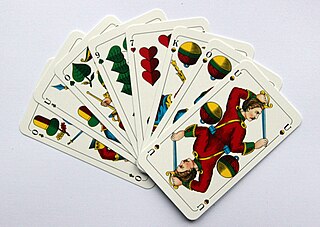
Mucken or Muck is a variation of the popular German card game, Schafkopf. However, unlike Schafkopf, it must always be played in teams of 2 players, so there are no soloist or Rufer ("caller") contracts. Mucken is mainly found in the province of Upper Franconia in the German state of Bavaria. Mucken is often played in Franconian restaurants, as it is part of the Franconian pub culture. The details of the rules vary greatly, even from village to village.